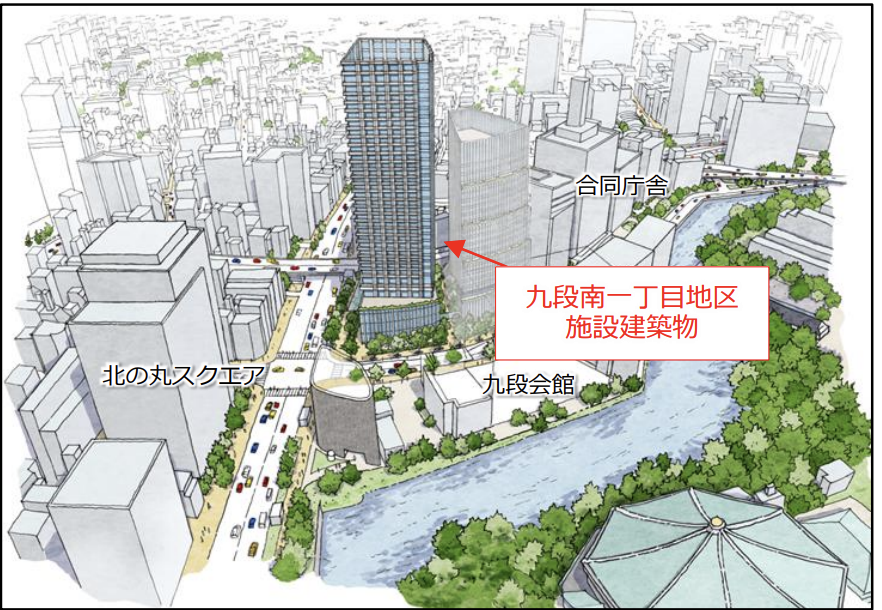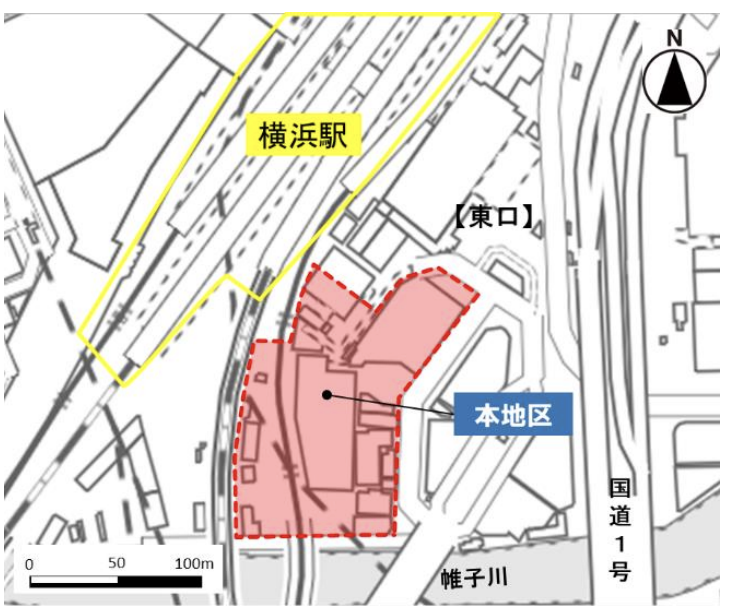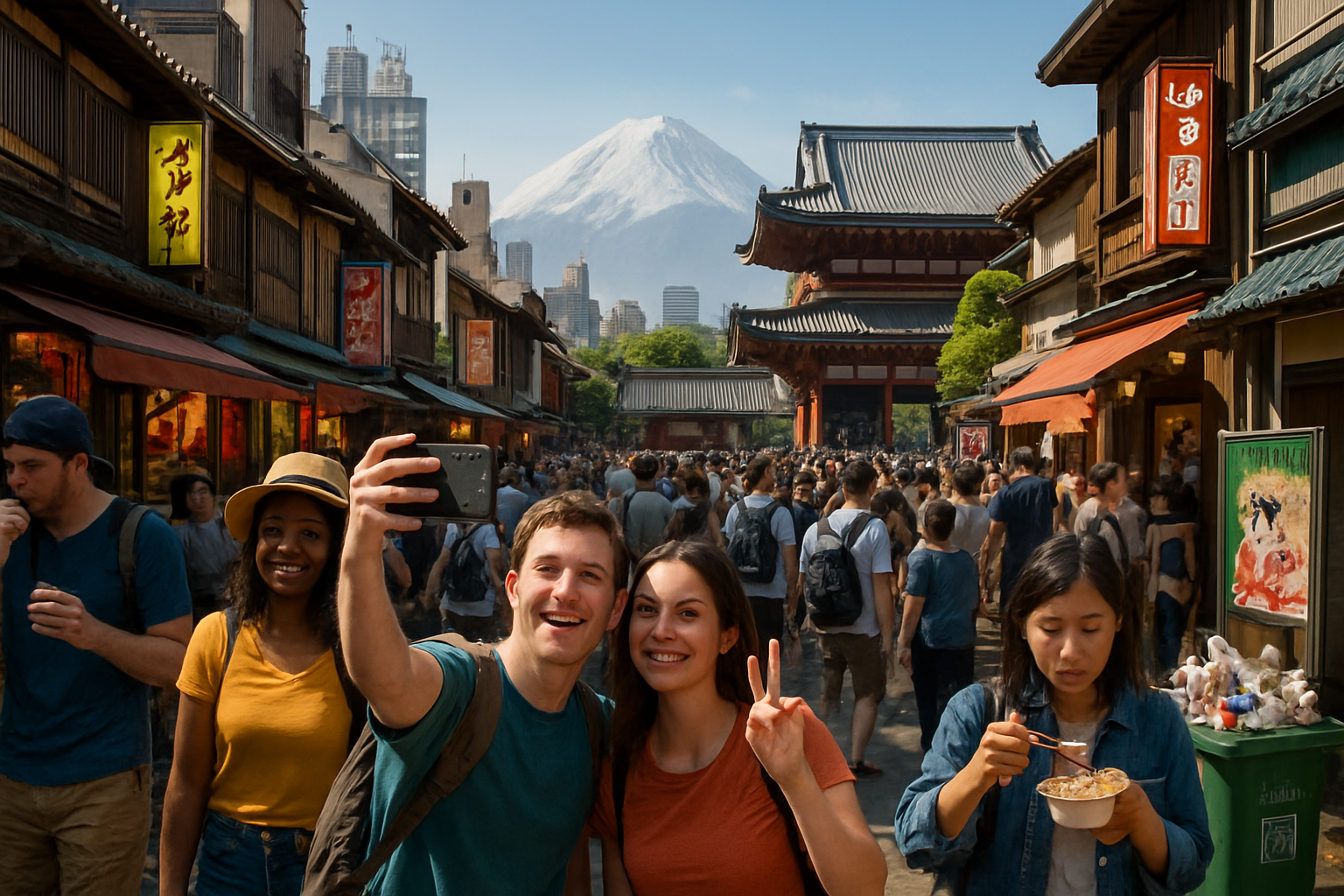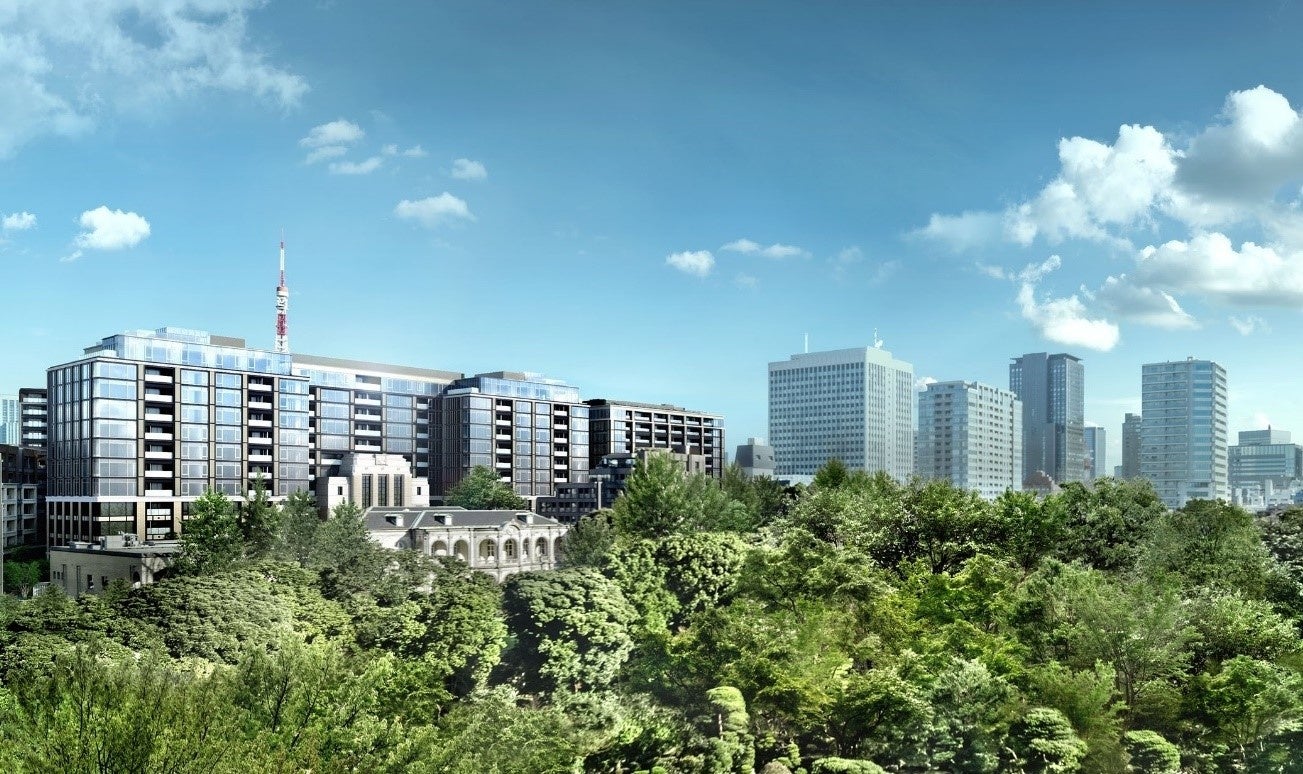The Ascott Limited, a leading hospitality company based in Singapore, operates approximately 960 lodging properties in more than 230 cities in 40 countries around the world. The Crest Collection is the most luxurious of Ascott's 14 brands.
Ascott "The Crest Collection" Brand Overview and Significance of First Expansion in Tokyo 
Although a relatively new brand added to the lineup in 2019, the brand is expanding globally, with seven properties currently in operation in Singapore, France, Malaysia, and Indonesia, and four more scheduled to open. Each property has a rich story rooted in the history and culture of its location and building, and its interior design reflects this story to provide a "one-of-a-kind stay experience. For example, "La Clef Champs-Élysées Paris" in Paris utilizes a 19th century historical building, while "The Grand Mansion Menteng The Grand Mansion Menteng" in Jakarta is set in a historic colonial mansion.
The Crest Collection" will finally make its first appearance in Japan. Tokyo Tatemono Co., Ltd. and Ascott have announced the opening of Japan's first Crest Collection-branded hotel as part of a large-scale redevelopment project in the Yaesu area of Tokyo Station. The hotel will be named " SEN/KA TOKYO by The Crest Collection " and is scheduled to open in the second half of fiscal 2029. This is the first collaborative project between Tokyo Tatemono and Ascott, and will be the first Crest Collection flagship hotel to be unveiled in Japan. The Ascott Group already operates the Ascott Marunouchi Tokyo and Oakwood Premier Tokyo serviced residences in the Tokyo Station area, and this will be the third hotel in the Tokyo Station area. The significance of having a globally acclaimed flagship brand in the heart of Tokyo is great, and this project is sure to attract attention both domestically and internationally.
Location Characteristics of the Tokyo Station Yaesu Area and Progress of Redevelopment
The Yaesu 1-chome North District, where the project site is located, is a prime central Tokyo location directly connected to Tokyo Station. The Yaesu Exit of Tokyo Station, where the Tokaido Shinkansen and Narita Express trains arrive and depart, is very close, and the area boasts excellent accessibility to both domestic and international destinations. A large-scale urban redevelopment project is currently underway in the area, with construction starting in November 2024 and the groundbreaking ceremony held on December 10. The redevelopment project consists of two blocks, the North Urban Area and the South Urban Area, and is being developed in phases. In the South Urban Area, a skyscraper of approximately 218 meters above ground level (mainly large-scale office buildings with a standard floor area of approximately 860 tsubo) will be constructed, and in the North Urban Area, an open waterfront space along the Nihonbashi River, which will be created by the underground Metropolitan Expressway, and low-rise commercial facilities will be located in close proximity to this space. The north and south districts will be connected by pedestrian walkways to enhance pedestrian circulation. In addition, an underground passageway connecting Tokyo Metro Nihonbashi Station and JR Tokyo Station will be constructed in the south section, which will eventually become part of a wide-area underground pedestrian network connecting Nihonbashi, Otemachi, Tokyo, and Kyobashi Stations. This will further enhance transportation convenience by strengthening the linkage between railroad stations and making it possible to travel regardless of weather conditions.
The redevelopment area will also significantly renew the scenery and liveliness of the Nihonbashi Riverfront. The continuous waterfront space created above ground by the undergrounding of the Metropolitan Expressway will include green areas and plazas, and is expected to become a valuable space where people can feel the richness of the waterfront in the heart of the city. The "Gate Plaza," which will link the north-south district with the waterfront space, and the development of a multi-layered pedestrian network will create interaction and liveliness in the entire Nihonbashi Riverfront area. This area is located halfway between Otemachi (Marunouchi) and Kabuto-cho (Nihonbashi Kabuto-cho) across Eitai-dori Street, with a concentration of financial-related companies in the surrounding area. Taking advantage of this location, the project plans to develop an urban MICE complex that can be used for multiple purposes, including business exchanges, conferences, and after-conventions. This facility, which will also serve as a base for the activities of high-level financial personnel, is expected to contribute to strengthening the competitiveness of Tokyo as an international financial city.
The Yaesu area is currently undergoing a major transformation in terms of both urban development and infrastructure improvement. For Tokyo Tatemono, Yaesu is also the site of its founding and is positioned as an extremely important project that is expected to generate synergies with the multiple neighborhood redevelopment projects the company is involved in. As the redevelopment progresses, the Yaesu area is dramatically increasing its attractiveness as a base for both business and tourism, and is creating value that is unique to Yaesu and different from that of the Marunouchi side of Tokyo Station.
Features of SEN/KA TOKYO by The Crest Collection
SEN/KA TOKYO by The Crest Collection" will be located in the mid-rise (6th to 9th floors) of the above-mentioned high-rise building in the south section. It will have a total floor area of approximately 7,100 m2 and a total of 92 guest rooms. The facility will be equipped with a lounge in the atrium overlooking the Nihonbashi River, and is expected to be designed to provide an open and extraordinary waterside experience even in the heart of the city. The guest rooms will be equipped not only for short-term stays, but also for long-term stays of up to a month or year, and will have elements of serviced apartments with kitchens, washer/dryers, etc. Positioned as a so-called "hotel-in-residence," the hotel aims to provide a space that combines the services and amenities of a five-star hotel with the comforts of home.
The concept of the hotel is "an Imperial drapery store in Edo ". This theme was chosen because the area near the proposed site was called "Gofukumachi" in the Edo period (1603-1867), and had a prosperous history with many kimono stores that served the shogun's family. The name of the hotel, "SEN/KA," also has its origin in this theme, with "SEN" overlapping the meanings of "dye" for dyeing, "sen" for fiber, and "sen" for selection, and "KA" expressing "house" and "store" for carrying on the tradition of kimono culture, which symbolizes Japanese culture. The interior design and furnishings also tell this story. The interior design and furnishings will reflect this narrative, and the space will be designed to evoke the emotion and aesthetics of an Edo kimono store. The plan is to offer a variety of services that incorporate kimono-related culture and techniques, such as hands-on kimono and dyeing and weaving programs and traditional crafts-oriented hospitality, to bring visitors into contact with Japanese culture during their stay. A Tokyo Tatemono representative stated, "We would like to realize an initiative to connect the history rooted in the land to the future through our business," aiming to make the facility not only a simple hotel operation but also a facility that contributes to the cultural inheritance of the region.
In terms of service, the hotel is expected to offer a full range of services befitting a top-class brand. The lounge in the building will provide a space where guests can relax and socialize, a concierge will provide attentive service, and housekeeping and laundry services will be available for long-term guests. Although details regarding plans to set up restaurants and bars have not been disclosed at this time, the location is also convenient as a base for enjoying gourmet food, with high-end restaurants in the Nihonbashi and Ginza areas nearby. In any case, this facility will offer a new type of luxury stay in the heart of the city, with facilities and services that will allow residents to "live as if they were living in the city.
Outline of SEN/KA TOKYO (plan)
-
Opening date: Second half of fiscal year 2029
-
Location: 1-1 Yaesu, Chuo-ku, Tokyo
-
Occupied floors: Yaesu 1-chome North District Redevelopment, South Urban Area, 6th to 9th floors of the high-rise building
-
Total floor area: approx. 7,100 m2
-
Number of guest rooms: 92
-
Facilities: Lounge (overlooking the Nihonbashi River from the atrium space), etc.
A one-of-a-kind lifestyle proposal for the affluent and ultra-affluent
The Crest Collection's story-rich stay experience is expected to appeal strongly to luxury travelers, especially the affluent and ultra-affluent class. The one-of-a-kind environment that offers a sense of local history and culture, rather than a one-size-fits-all luxury hotel, meets the needs of affluent travelers who value true experiential value. In fact, as the tagline of the brand concept "A Story Behind Every Door" suggests, guests will experience the depth of Japanese culture as if they have stepped back in time, with storytelling throughout the hotel. These extraordinary and memorable experiences will be a major attraction for the ultra-wealthy who seek value beyond price.
Furthermore, the "hotel-in-residence" type of business matches the lifestyles of the wealthy. For example, for global executives and wealthy individuals, the Tokyo residence will serve as a second home away from home. The flexibility to stay for one night or for longer periods of time makes this an ideal choice for business travelers for a short stay or a multi-month vacation. The flexibility of the accommodations, from one-night to long-term stays, provides a comfortable "living" experience for a variety of situations, from short-term stays for business trips to multi-month stays for vacations. This is also in response to the recent increase in demand for extended-stay travel, and in fact, Ascott has noted that "travelers are staying longer and demanding more diverse and flexible travel styles," and is focused on providing a stress-free, elegant extended-stay experience.
The hotel's location directly connected to Tokyo Station is also a major added value for wealthy travelers. The convenience of being able to check in without cumbersome transfers when arriving by Shinkansen bullet train or air from the provinces or overseas will be attractive to busy affluent business travelers. Surrounded by high-end department stores and long-established stores in the Nihonbashi and Ginza areas within walking distance, you can enjoy shopping and cultural experiences as you wish. Upon returning to the hotel, you will be greeted with hospitality rooted in the spirit of Japanese hospitality, and a personalized stay tailored to each guest's preferences. For example, you may be able to customize your stay to meet the demands of the ultra-wealthy by staging a special anniversary, arranging for a private tour guide, or providing a special meal through room service. Such a personalized experience is an irreplaceable value for the wealthy, and Senka Tokyo could be the perfect setting for this.
This project from the perspective of investment and asset value
The Crest Collection's first appearance in Tokyo is significant not only for the hospitality industry, but also for the real estate market. Tokyo Tatemono, the promoter of this project, has been actively attracting luxury brands that have not yet entered the Japanese market as part of its hotel business strategy, and will open the Four Seasons Hotel Osaka in Osaka in 2024 (the brand's first hotel in Japan in a skyscraper tower complex) and the Hilton's flagship Hilton Hotel in Kyoto. In Kyoto, Hilton Kyoto, the flagship brand of Hilton, will open in 2024. Furthermore, in 2028, the company plans to attract Accor Hotels' top luxury brand "Raffles" to Japan for the first time and open "Raffles Tokyo," and plans to introduce a series of world-class top brands to the domestic market. Senka Tokyo by Crest Collection" is one of the highlights of Tokyo Tatemono's luxury hotel lineup. The company's policy is to "maximize business value by selecting the most appropriate hotel operator for each location and project characteristic," and by welcoming Ascott's top brand in the prime location of Yaesu, the company aims to add value to the overall development project and enhance its ability to communicate its message.
From the perspective of the market environment, the opening of the new building is also expected to benefit from a tailwind. The Japanese government has set a target of 60 million foreign visitors to Japan by 2030, and is promoting infrastructure development and promotions aimed at making Japan a tourism-oriented country. After a period of recovery from the Corona disaster, inbound demand is once again on the rise, and the number of foreign visitors, including high-income earners, is expected to increase over the long term. Among these, Tokyo is a popular destination for both business and tourism, and the market has a particularly large potential to attract luxury travelers. Tokyo is highly regarded by wealthy travelers from many countries as a safe, clean, and culturally rich city, and there are growing expectations for accommodations that meet their increasingly sophisticated accommodation needs.
In response to this demand, a number of new luxury hotels have opened in Tokyo and other parts of Japan in recent years. In the Yaesu area, the opening of the Bulgari Hotel Tokyo in Midtown Yaesu in 2023 has become a hot topic. The competitive environment is becoming more active with the opening of high-end hotels such as "EDITION Ginza" and "JANU Tokyo" scheduled to open in Tokyo through 2024. However, a hotel like Senka Tokyo, which has a long-stay serviced residence function and a narrative of Japanese culture, is extremely unique, and this differentiating factor will be a great advantage in the market.
In terms of asset value, the rarity of a luxury hotel incorporated into a large-scale mixed-use development directly connected to Tokyo Station is noteworthy in itself. A mixed-use redevelopment project that integrates office, retail, and lodging facilities will raise the overall value of the property through a synergistic effect of tenant mix, and the hotel portion of the project is also expected to generate stable occupancy and earnings. In particular, this project has the potential to capture both business and tourist demand, as it is planned to include a center for the exchange of international financial personnel and MICE facilities as mentioned above. The interchangeable flow of hotel guests, office workers, event attendees, and other people will help improve the occupancy rate of the entire facility, which in turn will lead to higher profitability and asset value. Tokyo Tatemono is also working on this project under the slogan of "a large-scale complex near Tokyo Station and suitable as a gateway to the Nihonbashi riverfront area," and the attraction of Senka Tokyo is the very core of this strategy.
Furthermore, the news of attracting a world-class brand for the first time is expected to enhance the brand value of the area and attract the interest of real estate investors and wealthy individual investors. In the future, the added value of "an asset occupied by Ascott's top brand" may be advantageous in terms of evaluation when the hotel portion of the management rights or the property itself is included in a REIT or fund. For overseas investors, the first luxury hotel in Japan may also be seen as a highly attractive investment.
Overall, "SEN/KA TOKYO by The Crest Collection" is a project that goes beyond the mere opening of a new hotel and intersects with trends in Tokyo's urban development, tourism strategy, and hotel market. As specific plans and services are revealed in preparation for its opening in 2029, the full picture and impact of the project will continue to unfold, As specific facility plans and services are revealed in preparation for the opening in 2029, the full picture and impact of the project are expected to attract even greater attention.

Daisuke Inazawa
Representative Director of INA&Associates Inc. Based in Osaka, Tokyo, and Kanagawa, he is engaged in real estate sales, leasing, and management. He provides services based on his extensive experience in the real estate industry. Based on the philosophy that “human resources are a company's most important asset,” he places great importance on human resource development. He continues to take on the challenge of creating sustainable corporate value.

.png)













